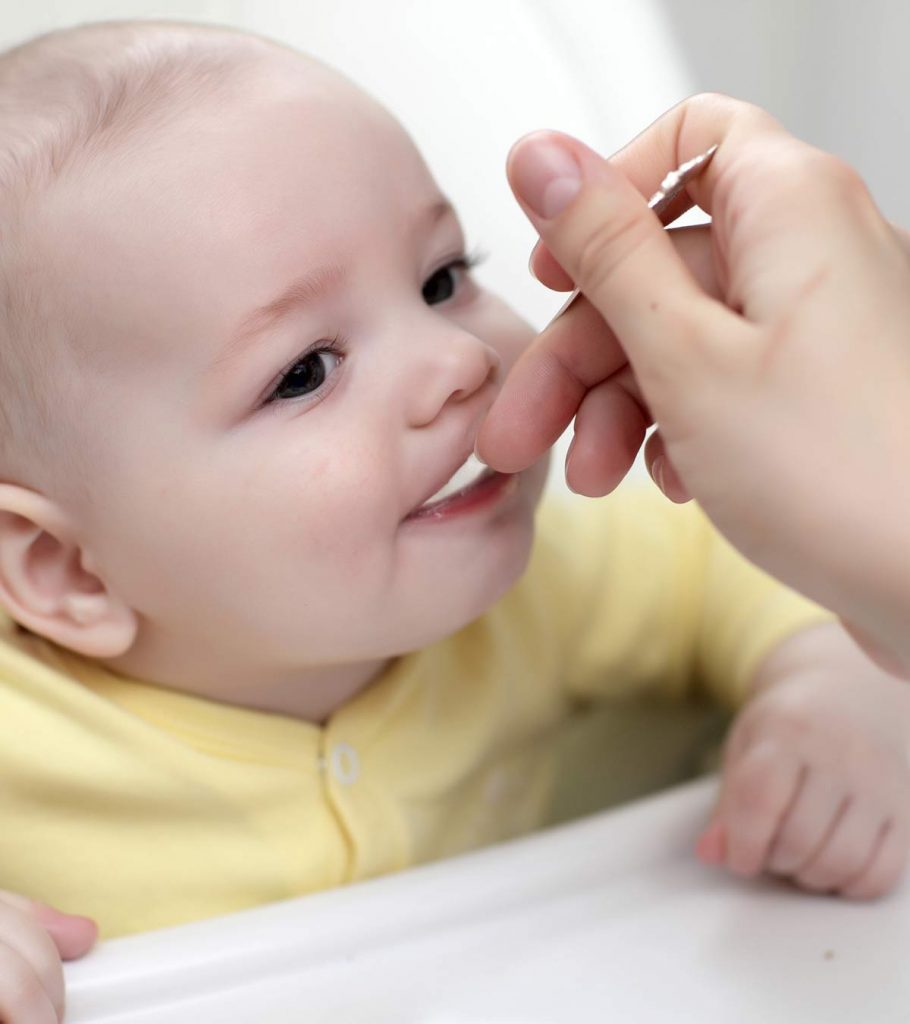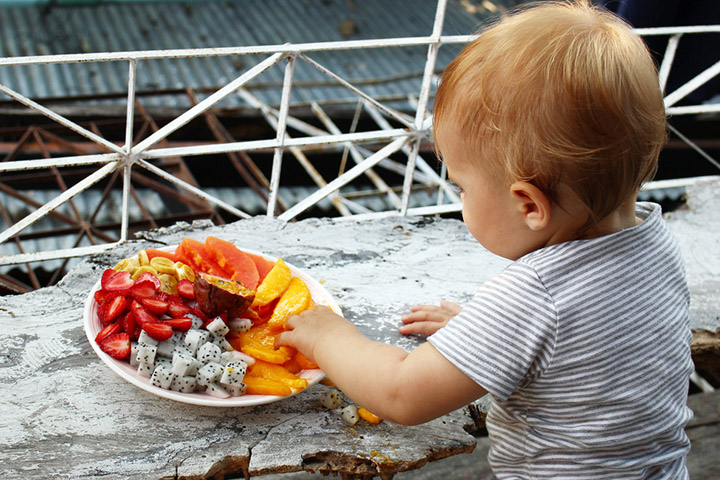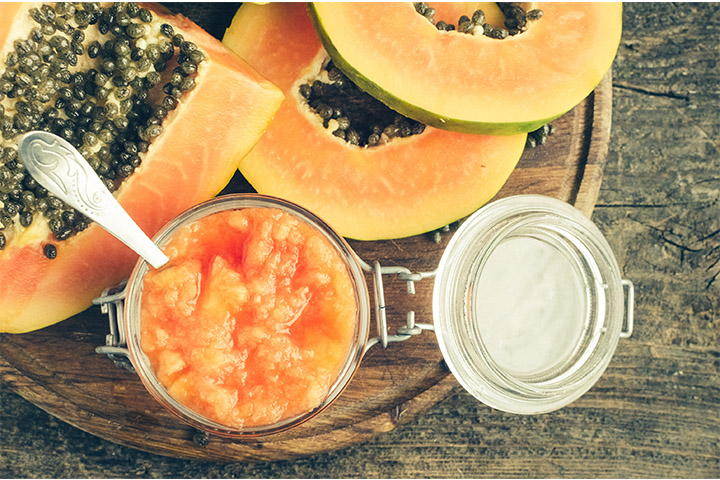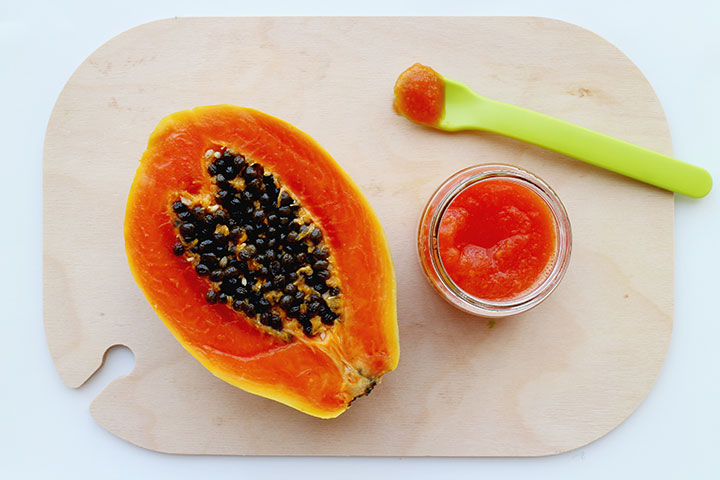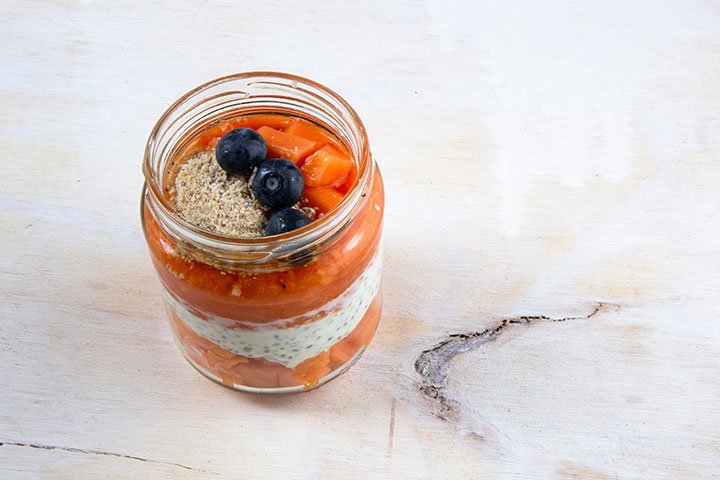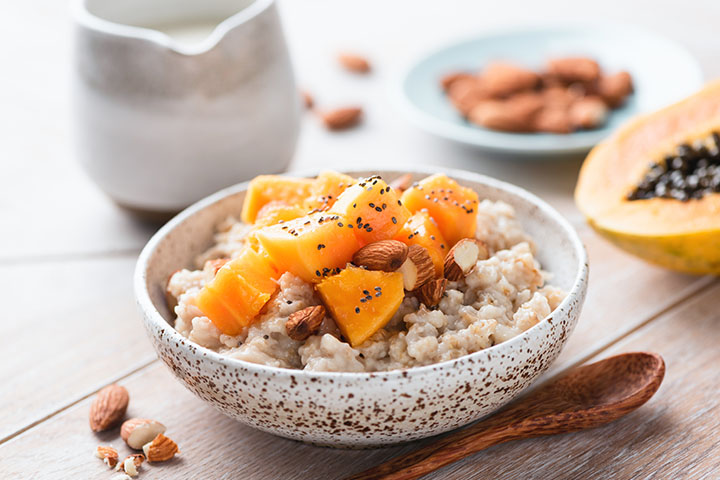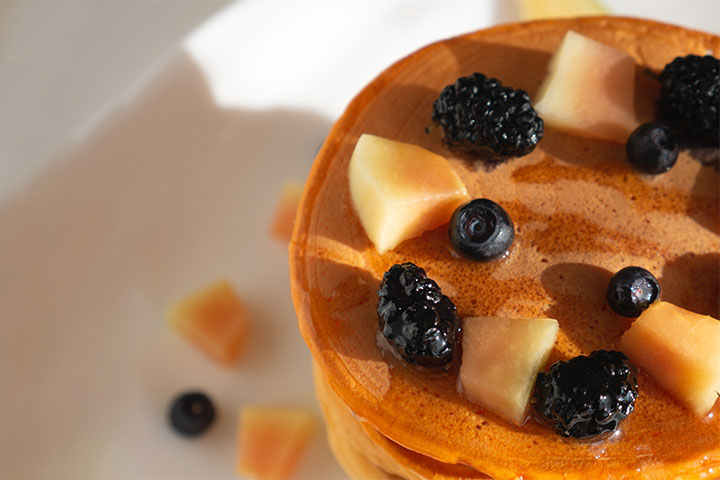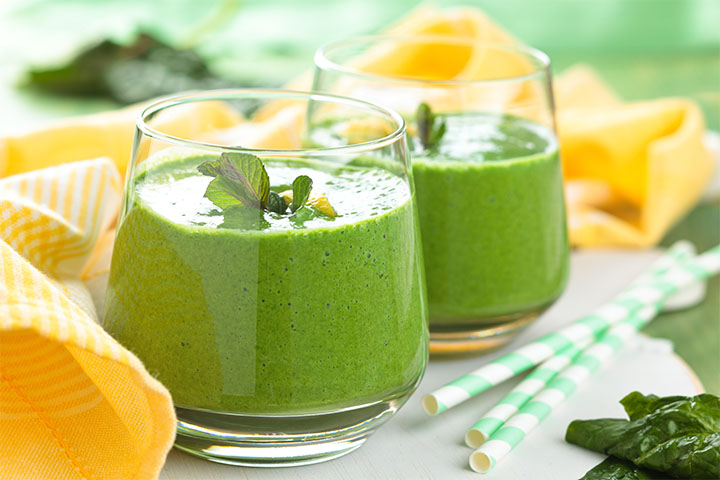When your little one starts eating solid foods, you might also wonder if papaya for babies is a healthy option. The ripe papaya (Carica) is a fruit frequently used as infant food with a soft texture and sweet flavor and has several important nutritional and therapeutic characteristics (1). But, do the numerous advantages of this delectable fruit also apply to infants?
Continue reading this post for information on the safety of papaya for newborns, its benefits, and precautions to take.
Is Papaya Safe For Babies?
The U.S Food and Drug Administration considers papaya fruit as “generally recognized as safe (GRAS)” for infants (2). Thus, depending upon the age of your baby, you can serve papaya to the baby.
When Can Papaya Be Introduced To Babies?
Once your baby starts consuming solids with comfort, you can introduce papaya in your baby’s diet (3). Some pediatricians, in general, recommend introducing papaya to a baby around seven and eight months. However, you could start the fruit early, after introducing solids such as apple, banana, and potato. A few recipes that you might consider while introducing papaya to babies are papaya puree, papaya pudding, papaya pancake, and papaya smoothie.
Please note, papaya is usually hypoallergeniciXSomething that is less likely to cause allergic reactions.. However, some cases of papaya allergy have been documented (2). Therefore, consult a pediatrician before introducing papaya to your baby.
Nutritional Value Of Papaya
Papaya is considered as one of the most nutrient-dense fruits ever known. It is a rich source of a potent form of vitamin-A, beta-carotene (4).
Below is the approximate composition of 100 grams of raw papaya with the recommended dietary allowance of nutrients for infants.
| Name | Amount | RDA |
|---|---|---|
| Water | 88.06g | – |
| Energy | 43Kcal | – |
| Fiber, total dietary | 1.7g | – |
| Sugars, total including NLEA | 7.82g | – |
| Calcium, Ca | 20mg | 210mg (0-6 months)
270mg (7-12 months) |
| Magnesium, Mg | 21mg | 30mg (0-6 months)
75mg (7-12 months) |
| Phosphorus, P | 10mg | 100mg (0-6 months)
275mg (7-12 months) |
| Potassium, K | 182mg | 500mg (0-6 months)
700mg (7-12 months) |
| Sodium, Na | 8mg | 120mg (0-6 months)
200mg (7-12 months) |
| Vitamin C | 60.9mg | 20mg |
| Folate, total | 37µg | 24µg (0-6 months)
32µg (7-12 months) |
| Choline, total | 6.1mg | – |
| Vitamin A, IU | 950IU | 1166 IU |
| Vitamin K | 2.6µg | – |
Sources: U.S. Department of Agriculture (5) and World Health Organization (6)
Health Benefits Of Papaya For Babies
Papaya has some prominent benefits for babies, as mentioned below in detail.
- Could support immunity: Papaya is considered to have nutraceutical properties. These properties are believed to enhance immunity and improve the quality of life in terms of good health due to several digestive enzymes. The fruit contains considerable amounts of vitamin-A, B, C, and proteolytic enzymesiXEnzymes that aid in the breakdown of food for energy and digestive function. like papain and chymopapain. These constituents are believed to provide antiviral, antifungal, and antibacterial properties to the fruit (7).
- Helps in digestion: In traditional medicine, papaya has been used as a remedy to treat digestive disorders. Papaya contains biologically active compounds such as papain, which is believed to help digestion (8). In addition, papaya has considerable amounts of water and fiber that could potentially help in maintaining digestive health by keeping constipation at bay.
- Supports healing: Papaya is believed to be helpful in healing wounds and sores. It has good amounts of vitamin-C and proteolytic enzyme, papain, which both aid in wound healing. A recent research study showed that topical application of papaya extract could possibly help in prompt wound healing (9).
- Works against intestinal worms: Papaya is considered as one of the oldest fruit antihelminticiXSubstance that works against parasitic worms. plants (10). However, its effectiveness was mostly anecdotal until a few years ago. But now, much in-vitro clinical research shows that certain bioactive compounds in papaya could possibly help work against gastrointestinal worms (11).
- Supports body functions: Papaya is one of the foods with considerable amounts of dietary folate. Folate is crucial for babies, as it supports many biochemical functions that are necessary for growth, development, and sustenance. The most crucial functions that folate performs are – metabolism, brain development, and DNA-RNA synthesis (12) (13).
- Supports vision: Papaya is one of the rich sources of vitamin-A, which is a vital nutrient for growth and development. In particular, vitamin-A helps in vision development that is crucial during the early years of life (14). A research study has shown the effectiveness of vitamin-A derivatives in treating retinal degenerative diseasesiXProgressive neurologic disorder affecting the retina of the eye. (15).
- Boosts overall health: Papaya has various vital nutrients with considerable amounts of antioxidants and biologically active compounds such as papain. It also has a lipidic composition that acts as anti-inflammatory markers (16). These valuable components of papaya make it a fruit that must be included in the diet, especially for babies.
Papaya also has considerable amounts of other micronutrients such as potassium and phosphorus, which are also important for babies.
Note: All the nutrients available in papaya can support the growth and development of your baby. However, papaya cannot be a standalone food for your baby, especially after six months of age. Introduce a variety of fruits, vegetables, and other food groups in your baby’s diet to ensure optimum nutrition.
You must also practice caution while introducing papaya in your baby’s diet. This is important as, like any other food, papaya could have its side-effects.
Side Effects Of Papaya For Babies
The following are the probable side effects of papaya for babies.
- Allergy: IgE-mediated hypersensitivity via pollen inhalation and fruit consumption has been documented in the case of papaya (17). If your baby is allergic to latex, then papaya allergy is likely to happen (18). If your baby has a history of allergies or anyone in the family has a history of allergy, then pediatric consultation is wise before feeding papaya to your baby.
- Stomach ache or cramps: Unripe papaya is known to have high amounts of latex. Latex can potentially upset the stomach leading to stomach cramps and aches (19). The amount of latex is known to reduce as the fruit ripens. Therefore, it is important to serve only ripe papaya to babies.
Hannah Whittaker, a pediatric and pregnancy dietitian from Liverpool, England, says, “Papaya is a fiber-rich fruit and is high in an enzyme called papain which supports digestive issues. However, I would not advise giving papaya to babies to support with relieving gas, as it is likely to cause negative effects on the gastrointestinal tract due to its high-fiber content.”
Following some precautionary steps could ensure the safe consumption of papaya for babies. So let’s check some of them in brief.
Precautions To Take While Serving Papaya To Babies
Depending upon the signs of readiness, you can start feeding papaya to the baby with the following precautions in mind (20) (3).
- Never introduce two new food items together, as the same creates confusion to determine which one is not suitable for your baby. Always follow a three to five days ‘wait and watch’ rule.
- While preparing any item with papaya, maintain hygiene as babies under two years of age are most vulnerable to infections. Therefore, wash and peel the fruit properly and remove any seeds or piths carefully.
- Select only ripe papaya as they are easy to digest.
- Start with the puree form of papaya. Ensure no lumps are there in the puree to avoid choking.
- Initially, feed only small amounts such as a teaspoon or two.
- As the baby grows, you can give papaya as finger food, and then you can mix it with other food items such as porridge to amplify the nutritive value of the diet as a whole.
After knowing the basics about papaya, it’s time to check some recipes that you might like to try for your baby.
Quick Papaya Recipes
As you plan to give papaya to your baby, refer to the age group of your baby and choose the best way to feed. Below are some age-specific homemade baby food recipes that you can try.
For Babies 4-6 months
Babies between the age of four to six months have a very vulnerable digestive system. Therefore, it is wise to introduce papaya to them in puree form. Below is a recipe for papaya puree that you may like to try.
Papaya puree
You will need:
- 1 cup peeled and chopped papaya
- Water
How to:
- Blend the peeled and chopped papaya pulp in a blender. Ensure that no seeds are there in it.
- If there are any lumps, then add ¼ cup of water and blend the mixture again.
- As you see a smooth paste, transfer that in a bowl.
- Serve fresh puree to your baby and store the left-over in a steel container. Do not use a puree if it is more than two days old. You can also add breastmilk or formula milk in the puree.
You can also incorporate other healthy food items to customize the puree recipe according to your baby’s preferences. Sharing a healthful addition to her baby’s diet, a mother and a blogger recounts how spinach and papaya puree helped her treat her baby Athyn’s low iron levels, “I was very worried to stop the iron drops knowing he (Athyn) has a low count (iron level) through blood work. So I made up my mind and ensured he gets greens in his everyday diet. I add at least a handful of spinach to his khichdi every day for lunch. But some days, that just won’t do. When more is needed, the puree form has to come in. Although Athyn is not a big fan of purees, this (spinach and papaya puree) one is a hit with him, possibly because of the sweetness Papaya brings in (i).”
For babies 6-8 months
As per WHO, you can feed half a cup of soft food two to three times a day to babies of six to eight months of age. Your baby can eat anything except honey and egg whites until the age of one year (21). So, now is the right time that you mix papaya with other foods to make a more wholesome recipe.
Papaya and blueberry yogurt
You will need:
- 1 cup peeled and chopped papaya
- ½ cup blueberry
- 1 cup whole milk yogurt
How to:
- Take a blender and put peeled and chopped papaya with thoroughly cleaned, de-skinned, and deseeded blueberry in it.
- Blend the mixture well. Ensure no lumps are formed.
- Now add yogurt to the mixture and blend the mixture once again until you get a smooth paste.
- Serve this delectable snack to your baby as an early evening snack.
Papaya Oatmeal
You will need:
- ¼ cup rolled oats
- 1½ cups water
- ½ tsp cardamom powder
- ½ cup ripe papaya puree
- 1 bay leaf
How to:
- Cook oats in water on low-medium heat to prepare a smooth, lump-free slurry.
- Add cardamom and bay leaf once the mixture begins boiling and cook for five minutes.
- Switch off the flame. Add the ripe papaya puree to the oatmeal and mix well.
- Serve warm. You may add half a teaspoon of dried fruits and nut powder to raise the recipe’s nutritional value.
For babies 9-12 months
As your baby reaches this age group, you can start feeding soft food into small pieces instead of mashing or blending them. It is likely that by this age, your baby might even start to eat food with fingers.
Papaya pancake
You will need:
- 1 ½ cups multigrain flour
- 2 tsp baking powder
- 2 tbsp brown sugar
- 1 tsp kosher salt
- 1 ½ cups whole milk
- 2 large eggs
- 1 tsp extract
- 2 medium papayas (peeled, seeded and diced)
- Pure maple syrup (optional)
- ½ cup chopped almonds (optional)
How to:
- In a bowl, add multigrain flour, sugar, salt, eggs, and baking powder. Whisk the mixture well and keep it aside.
- Now, take a blender and add chopped almonds and diced papaya in it. Blend them together until you get a smooth paste.
- Add the blended papaya and almond mix to the mixture prepared earlier. Whisk the entire mixture again and keep it aside.
- Take a flat pan and keep it on medium heat, pour the pancake batter. Cook for a minute and flip. Cook the other side for one minute too. You can see the sides turning brown, and that is an indication that pancakes are cooked.
- Serve hot pancakes with maple syrup.
Tip: As you have added papaya to the mixture, chances are there that the pancakes might stick to the pan. In such a scenario, drizzle a few drops of oil on the pan before spreading the batter.
Papaya And Spinach Smoothie
You will need:
- 10 spinach leaves (blanched)
- 1 cup ripe papaya cubes
- 1 cup unsweetened soy milk
- ½ cup unsweetened Greek yogurt
- 1 tsp dried fruits powder
How to:
- Blend all the ingredients using a blender or food processor into a smooth, lump-free fluid.
- Pour the smoothie into a cup with a wide-hole straw and serve. Alternatively, you can pour the smoothie into a bowl and let the baby eat it with a spoon.
- You can freeze the leftover smoothie and serve it to your baby as an ice pop.
Recipes involving papaya are countless; however, choose a recipe that meets the nutritional needs of your baby.
Papaya for babies can be introduced when the baby begins to eat solid foods such as vegetables or fruit purees. Vitamin A and carotenoids are abundant in papaya, and it helps boost immunity and digestion in babies. It is also known to reduce intestinal worms in babies. You may introduce papaya in small quantities and look for allergies or stomach cramps. If there are any issues, avoid giving papaya to the baby. Papaya puree, blueberry yogurt, and papaya pancakes are some baby-friendly papaya recipes.
Key Pointers
- Papaya can be introduced into a baby’s diet between seven and eight months of age, under a doctor’s supervision.
- Papaya is a rich source of vitamins (A, B, C, folate) and minerals (calcium, magnesium, and potassium) and has antimicrobial and anthelmintic properties.
- Papaya might boost immunity and overall health, aid digestion, and wound healing.
- Excessive consumption of papaya can cause side effects in babies, such as allergies and stomach cramps.
- It is recommended to use fully ripe, thoroughly cleaned, and pureed papaya for baby food, and to follow the three-day rule to check for allergies and sensitivities.
